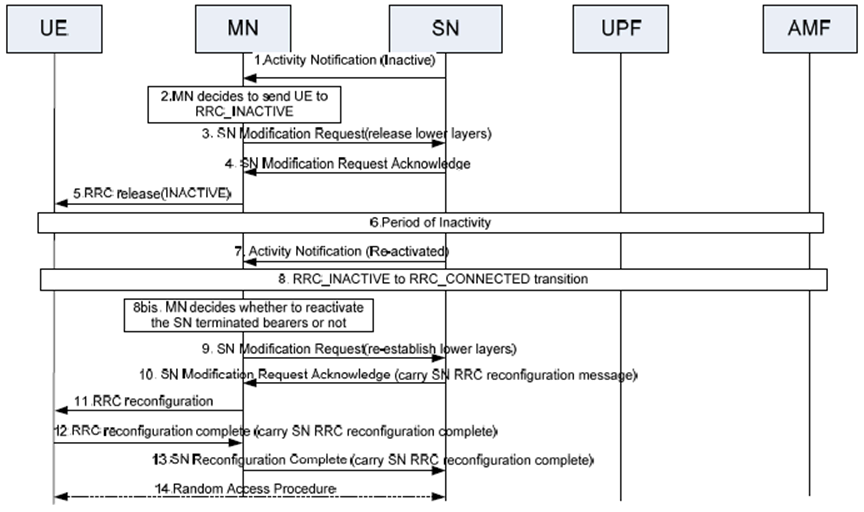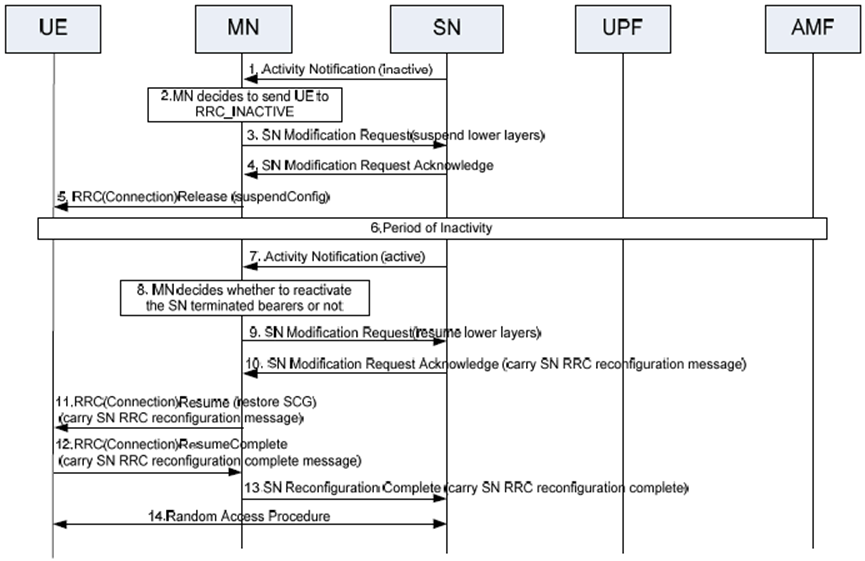Content for TS 37.340 Word version: 18.2.0
1…
4…
4.2…
4.3…
5…
7…
8…
9
10…
10.2…
10.2.2…
10.3…
10.3.2
10.4…
10.5…
10.5.2
10.6
10.7…
10.8…
10.9…
10.10…
10.11…
10.12…
10.12.2
10.13…
10.14…
10.15
10.16…
10.17…
10.18…
10.19…
10.20
11…
A
B…
10.12.2 MR-DC with 5GC p. 95
The Activity Notification function is used to report user plane activity within SN resources or to report a RAN Paging Failure event to the SN. It can either report inactivity or resumption of activity after inactivity was reported. In MR-DC with 5GC the Activity Reporting is provided from the SN only. The MN may take further actions. RAN Paging Failure Reporting is provided from the MN only.
MR-DC with 5GC Activity Notification

Step 1.
MR-DC with 5GC with RRC_INACTIVE - SCG configuration released in SN
The SN notifies the MN about user data inactivity.
Step 2.
The MN decides further actions that impact SN resources (e.g. send UE to RRC_INACTIVE, bearer reconfiguration). In the case shown, MN takes no action.
Step 3.
The SN notifies the MN that the (UE or PDU Session or QoS flow) is no longer inactive.

Figure 10.12.2-2 shows how Activity Notification function interacts with NG-RAN functions for RRC_INACTIVE and SN Modification procedures in order to keep the higher layer MR-DC NG-RAN resources established for UEs in RRC_INACTIVE, including NG and Xn interface C-plane, U-plane and bearer contexts established while lower layer MCG and SCG resources are released. NG-RAN memorises the cell group configuration for MCG in order to apply delta signalling at resume, as specified in TS 38.331. After the UE has transited successfully back to RRC_CONNECTED, lower layer SCG resources are established afterwards by means of RRC Connection Reconfiguration.
The Activity Notification function may be used to enable MR-DC with 5GC with RRC_INACTIVE operation. The MN node may decide, after inactivity is reported from the SN and also MN resources show no activity, to send the UE to RRC_INACTIVE, while keeping the SCG configuration. Resumption to RRC_CONNECTED may take place after activity is reported from the SN for SN terminated bearers.
Step 1.
MR-DC with 5GC with RRC_INACTIVE - SCG configuration suspended in SN
The SN notifies the MN about user data inactivity for SN terminated bearers.
Step 2.
The MN decides to send the UE to RRC_INACTIVE.
Step 3/4.
The MN triggers the MN initiated SN Modification procedure, requesting the SN to release lower layers.
Step 5.
The UE is sent to RRC_INACTIVE.
Step 6-8.
After a period of inactivity, upon activity notification from the SN, the UE returns to RRC_CONNECTED.
Step 8bis.
MN decides whether to reactivate the SN terminated bearers. If (e.g. due to UE mobility), MN decides not to reactivate the SN terminated bearers, it initiates the MN initiated SN release procedure and the procedure ends.
Step 9/10.
The MN triggers the MN initiated SN Modification procedure to re-establish lower layers. The SN provides configuration data within an SN RRC reconfiguration message.
Step 11-14.
The RRC Connection Reconfiguration procedure commences.

Figure 10.12.2-3 shows how Activity Notification function interacts with NG-RAN functions for RRC_INACTIVE and SN Modification procedures in order to keep the full MR-DC NG-RAN resources established for UEs in RRC_INACTIVE. When the UE transits successfully back to RRC_CONNECTED, lower layer MCG and SCG configurations are restored or reconfigured by means of RRC (Connection) Resume.
Step 1.
The SN notifies the MN about user data inactivity for SN terminated bearers.
Step 2.
The MN decides to send the UE to RRC_INACTIVE.
Step 3/4.
The MN triggers the MN initiated SN Modification procedure, requesting the SN to suspend lower layers.
Step 5.
The UE is sent to RRC_INACTIVE.
Step 6-7.
After a period of inactivity, the MN receives activity notification from the SN.
Step 8.
The MN decides whether to reactivate the SN terminated bearers. If (e.g. due to UE mobility), the MN decides not to reactivate the SN terminated bearers, it initiates the MN initiated SN release procedure, rather than the MN initiated SN modification procedure in steps 9/10. If the MN decides to return the UE to RRC_CONNECTED, the network triggered state transition from RRC_INACTIVE to RRC_CONNECTED commences as described in clause 9.2.2.4.2 in TS 38.300.
Step 9/10.
The MN triggers the MN initiated SN Modification procedure to resume the SCG lower layers. If the SCG configuration needs to be updated, the SN provides the configuration data within an SN RRC reconfiguration message.
Step 11/12.
The UE is instructed to resume both the MCG and the SCG. If the SCG configuration is to be updated, the new configuration is provided in the RRC(Connection)Resume message.
Step 13.
The MN informs the SN that the UE has completed the reconfiguration procedure successfully, via the SN Reconfiguration Complete message, including the SN RRC response message, if received from the UE.
Step 14.
The UE performs synchronisation towards the PSCell of the SN.